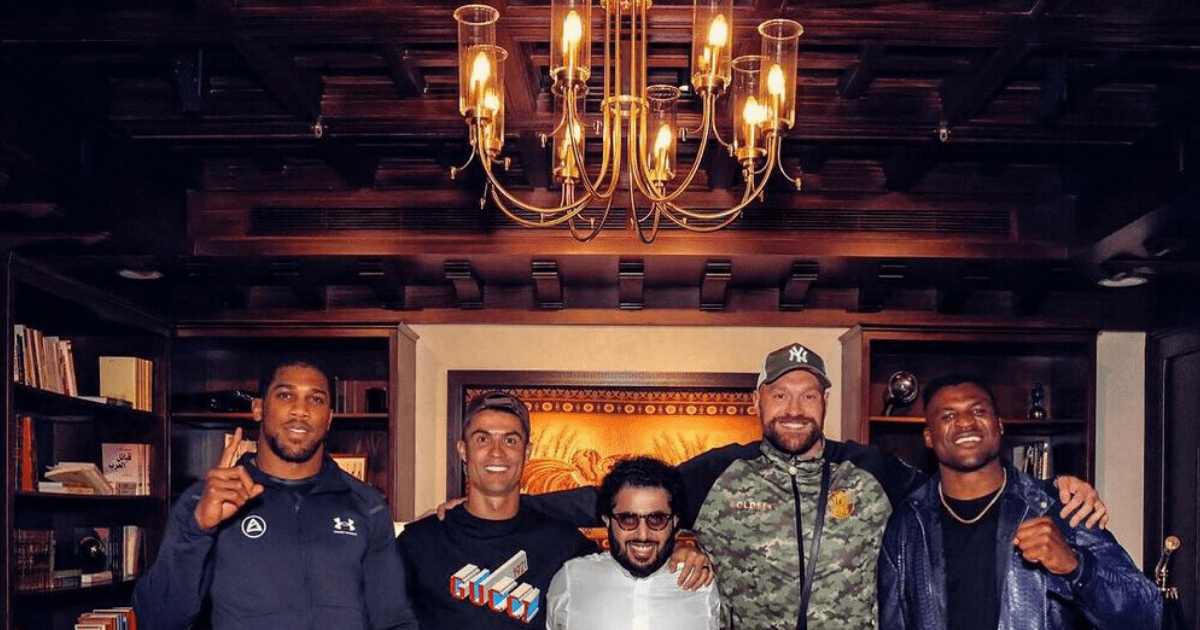What Happened at the Meeting?
Anthony Joshua and Tyson Fury stood side by side during a tense meeting in Saudi Arabia, where Fury was there to support Francis Ngannou in his fight against AJ. Despite standing together, not a single word was exchanged between the heavyweight rivals.
Verbal Altercation and Reunion
Before posing for a picture with Cristiano Ronaldo and Saudi boxing powerbroker Turki Alalshikh, Joshua and Fury had a verbal altercation. However, Fury's assistant coach revealed that there was no communication between the two boxers during the gathering.
Fury's Confrontation with Ngannou
During the meeting, Fury confronted Ngannou about comments he allegedly made in interviews, accusing him of calling him a coward and a yellow belly. Despite the tension, Ngannou denied making such statements, leading to a heated exchange between the fighters.
Frequently Asked Questions
What are the main components of a professional boxer’s routine?
A boxer’s routine is made up of several main components. This includes technical skill development and tactical drills. It also includes strength and condition, sparring sessions, and mental prep. Tactical drills allow for the development of fight strategies while focusing on technique. Training exercises increase athleticism and sparring gives you a practical fighting experience. Mental training is aimed at building resilience, confidence and focus.
What kind of diet should a novice boxer follow?
A novice should consume a diet with a balance of nutrients that supports intense workouts, and promotes recovery. It is generally recommended to consume a mix of carbohydrates for energy, lean proteins for muscle repair and growth, and healthy fats for overall health. It is also important to consume vitamins and minerals as well. A sports nutritionist will be able to provide a customized diet plan tailored to the boxer’s training regime and weight class goals.
How important is physical conditioning in professional boxing?
Professional boxing requires a high level of physical conditioning. The sport demands a high level of strength, speed and endurance. Professional boxers have to adhere to a specific fitness program which includes aerobic, anaerobic, strength, resistance, and flexibility exercises. Boxers’ ability to perform and train effectively in the ring will be compromised if they do not have superior physical condition.
How long is it usually required to become a professional fighter?
The time taken to become an elite boxer is variable. It is dependent on the starting level of the boxer, his/her ability to adapt, and how well he/she trained. In general, it takes several years of training and experience as an amateur to be ready for the professional world. However, some exceptional talents might advance more quickly, while others may need more time to develop.
What qualities should a person look for in a trainer or coach of boxing?
A boxing coach should have experience in the sport, be able to work with other boxers successfully, have a compatible coaching style, as well as a solid understanding of its technical and strategic components. A good trainer will also emphasize safety, conditioning, and personal growth. To reach your boxing potential, you need a coach who is able to motivate and communicate well.
What roles do managers and promoters play in a boxer’s professional career?
Promoters and managers play an important role in a boxer’s professional career. Managers manage the career of boxers, negotiate contracts, and take care of their business affairs. They also provide support in selecting the right fights and looking after the boxer’s interests. Promoters are more focused on marketing, event organization and attracting sponsorship attention. They also focus on enhancing a boxer’s profile.
Is there an age limit for boxing?
There are age restrictions in professional boxing. Most boxing commissions insist that boxers must be 18 or older in order to fight professionally. Although there is not a set age limit for the upper age bracket, factors like physical capability and health will naturally limit what age one can safely and effectively compete. It is important that older athletes are thoroughly evaluated for risk and fitness before they take up a professional sport.
Statistics
- Professional boxers typically train 4 to 6 hours per day, 5 to 6 days a week, depending on their fight schedule.
- A study showed that most professional boxers have spent more than 4 years in training before their first professional bout.
- As per recent surveys, only about 17% of professional boxers reach a title shot opportunity in their careers.
- Less than 10% of professional boxers are undefeated throughout their career, highlighting the sport’s competitive nature.
- On average, a professional boxer spars between 100 to 200 rounds in preparation for a major fight.
- Nutrition experts emphasize that over 70% of a boxer’s diet should focus on carbohydrates and proteins for energy and recovery.
- Research shows that a boxer’s reaction time is typically under 0.25 seconds, honed through repetitive drills and sparring.
External Links
boxingscene.com
boxingforum24.com
ibhof.com
sweetsciencefitness.com
expertboxing.com
wbcboxing.com
teamusa.org
How To
Learn how to improve your boxing footwork
A strong boxing footwork is a skill that every professional boxer must possess. Start by improving your stability with balance exercises. Agility ladder drills can be used to improve foot speed and coordination. Mirror shadowboxing can help you refine and observe your movements. Use jump ropes to improve rhythm and endurance. Regular sparring sessions can also help you gain practical experience on how to move effectively around the ring when under pressure.

